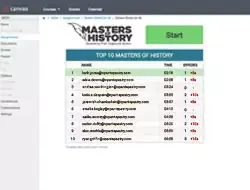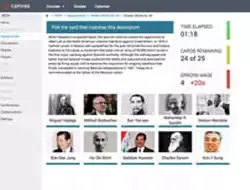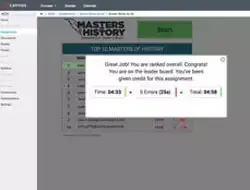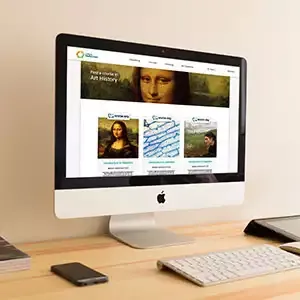Masters of History
Utah State University
Masters of History (MOH) is an online flash card game with a leaderboard designed to motivate university students to learn historical facts. Students play the game by matching the description of a famous historical person with the person's name and picture. After a student completes a deck of 25 cards, they are scored based on how fast they completed the deck and the number of mistakes they made. If their score is one of the top 10 in the class, their name is listed on a leaderboard that all students see before and after they play MOH.
Problem
Dr. Clayton Brown, a history professor at Utah State University, approached Atomic Jolt to create a game-like flash card application to enhance his online class. He was already using the Canvas LMS to teach his online classes; but he believed that students would relate to an online game better and be more willing to learn the historical facts taught in his class.
Solution
While there is a variety of options you could put into a flash card application, Dr. Brown's budget was limited, so the project was scoped to a specific deck of cards. We built MOH as an LTI Application that extends Canvas so it could be easily incorporated into Dr. Brown's online classes. We designed MOH as a single-page Javascript application to enhance the feel of an interactive game. We refined the timing and types of interactions through user testing with target students. MOH supports LTI grade writeback so that when it's used as a Canvas assignment, it writes back a score to the Canvas gradebook, giving students credit for mastering historical facts.
Bottom Line
MOH was delivered on time, within budget, and with enhancements beyond the original design, based on user feedback. Dr. Brown has used MOH with multiple classes and received good results and feedback. Students like the game and it appears to improve their performance. Both Dr. Brown and Atomic Jolt have presented MOH to other faculty and received a lot of interest. Consequently, we are exploring a follow-on project to extend the functionality of MOH so that it can be used for more classes and subjects.





